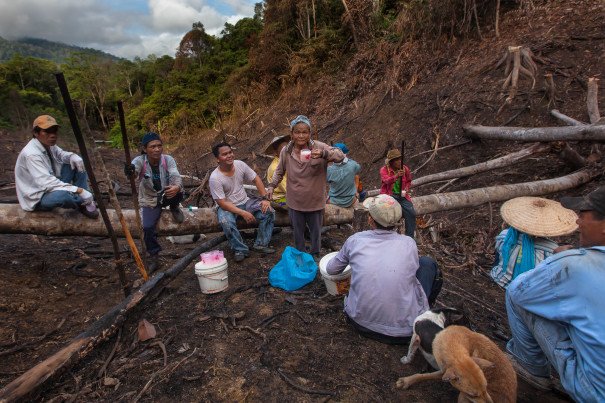
A Thousand Maggot‑Like Grains of Alcoholic Rice

A Thousand Maggot‑Like Grains of Alcoholic Rice
Burak in Long Semiyang
The people of Long Semiyang took me into their homes after inclement weather forced me and my motorcycle off the treacherously muddy jungle roads.
Beyond mountaintops that fade into a grey blanket of morning mist, an equatorial sun rises, unseen, over the heart of Borneo. My wooden spear, wrist-thick and tipped with pointed steel, thrusts into the charred ground rhythmically. Each impact sends up a puff of grey ash that swirls in the still air before dissolving into the predawn light. The deep green of the slope on the opposite side of the valley stands in stark contrast to the charred remains of the jungle that stood here only days before. Those responsible for this wasteland, a dozen men of the Kayan tribe, are strung out to the left and right of me in a staggered line. With eyes directed downwards, they, too, stab at the blackened earth with sharpened lengths of wood as long as a man is tall as they navigate the smoldering tree trunks that litter the slope of the valley.
The Kayan women follow us at a distance, hunched over as they feed handfuls of gabah, the husked rice grains saved from last season’s harvest, into the divots left by our spears. Without the tiny holes we create, this years’ harvest will be washed into the river by the first rains before it has a chance to take root. Working next to me, my host, Mathew, interrupts the call of a group of Bornean gibbons with his own call of “burak, burak, burak burakburak!” each repetition increasing in tempo and volume.
One of the younger Kayan boys scampers over and around the blackened remains of the forest towards us, a white pail in one hand, a stack of pink plastic cups in the other. The pail is filled with a raw and unfiltered rice-beer; burak in the local language. A product of the the fermentation of cooked rice with naturally occurring yeasts, clumps of the brew slide from the cup as it’s scooped out, falling back into the bucket with an audible smack. With the consistency of bubur, a rice porridge breakfast dish popular in parts of Southeast Asia, and a flavor reminiscent of the finest cask wines from my adolescence, it takes a moment or two to prepare my empty stomach for this onslaught first thing in the morning.
I attempt not to retch as a thousand maggot-like grains of alcoholic rice wriggle over my tongue and down the back of my throat. Throughout the morning, one draught follows another until I’m certain I can taste the burak in my sweat, which attracts the attention of a small swarm of Giant Asiatic honey bees. The bees become the ultimate test of my composure as I desperately try to resist swatting at their irritating advances as they search for a salty treat. They’re placid enough, but if threatened deliver one of the most painful bee stings in the world. Mathew tells me, “More burak is the solution. It will calm your nerves.”
When the field is planted, the drinking continues in a more civilized manner, back at the twin wooden longhouses of Long Semiyang. Clean clothes appear with a slightly more refined bottle of burak, still young with a milky white color and grainy texture, but filtered of rice grains, which makes all the difference. A good bottle of burak can take months to settle into the translucent final product and reach its full wine-like potency.
After a meal of chicken soup with garlic, ginger, chilies and native lemongrass, a hand-carved blowpipe appears from within the longhouse. The sharpened tips of a handful of darts, darkened with a lethal poison, are carefully removed and thrown into the fire to prevent accidents, as a jungle drinking game develops. A square of cardboard, crude concentric circles drawn on it, is placed some distance away. Glassy, bloodshot eyes take aim down the length of the smooth, dark, tropical hardwood cylinder as an alcohol infused breaths sends the disarmed darts, one at a time, towards the target. The shooter furthest from the bullseye is forced to drain his mug before the next round can begin.
As the empty bottles begin to pile up and the darts get lost in the long grass behind the target, the number of competitors dwindle. By mid-afternoon, the burak has been flowing for nine hours straight and we all need spare some strength for tomorrow. This is, after all, only the third day of a planting season that will last a full week, each consecutive day following the same routine: predawn alcoholic rice porridge for breakfast in the fields, a freshly cooked lunch, then drinking games before an afternoon nap. As I doze drunkenly on a rattan mat, I begin to understand why the Kayan had a book named Drunk Before Dawn written about them.